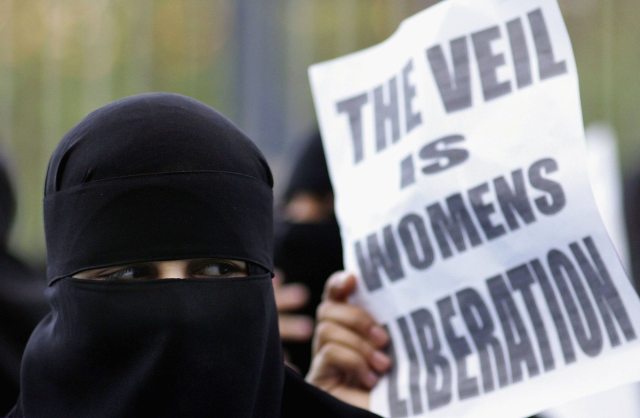
“It’s ok, you can wear your niqab here.” These were the first words Hessa heard on her arrival to the UK after, as an apostate, she had fled the terror of the Islamist Saudi regime. This well-intentioned if misplaced advice from a British Muslim border force official shook her faith in the British values of the secular state; a simple statement that prevented her from feeling able to claim asylum immediately at the airport.
Chatting to Hessa, what strikes me is that her dreams about life in the UK are made of the small, prosaic freedoms that mark out life in a liberal democracy; the freedom to leave the house unchaperoned, to wear a vest top in the sun, to go to the cinema. I asked her what she thought about Boris Johnson’s comments, that women who wear the burqa look like letterboxes.
After the laughter died down she replied:
“It’s funny, but underneath is a painful truth because from the age of 13 I was forced to cover-up. For years I didn’t feel the sun on my skin, and people couldn’t see my feelings when I spoke.”
Now in the UK awaiting the outcome of her claim for asylum, Hessa explains what she thinks of Muslim women in the UK who cover-up:
“I feel sad for them, they have been brainwashed into believing that wearing burqas or niqabs makes them more pious. It’s ridiculous because this practice is cultural and has little to do with religion. These clothes come from the minds of men in the Arabian peninsula not so much the Koran.”
Arguably it is not just those who wear the uniform of Islamic fundamentalists who are brainwashed, so are the liberal Left who defend the women’s ‘choice’ to do so. A new taboo has emerged that is fanatically enforced; those who are not from Muslim backgrounds must apparently not criticise the cultural practices that are lazily associated with all Islam.
And these practices are being brought into the high street. From H&M’s ‘Modesty Range’, which is apparently designed to be “diverse and inclusive”, to the recent GAP advertising campaign which featured a little girl in a hijab, big business is keen to cash in on covering-up. When white women like me question this normalisation we are smeared as ‘white feminists’ and accused of harbouring racist beliefs. But it is my belief that there is nothing more racist than thinking something is acceptable for ‘other’ people that you would not want for yourself.
The concealment of women’s hair, face and bodies is pernicious and historic with roots and a reach far beyond Islam; over 3,700 years ago, the ancient Mesopotamian Code of Hammurabi made the veiling of men’s wives, daughters and, indeed, concubines of the upper classes mandatory, (though street prostitutes were forbidden from covering, one might surmise because they were deemed public property).
Veiling, whether it is the nun’s wimple, a bride’s veil or the hijab, as worn by some Muslim women, has always been a symbol of misogyny, undeniable evidence of male dominion and fear of female sexuality.
And yet so many lefties are tying themselves in knots defending the freedom of a very small section of Muslim women to choose to engage in this harmful practice. At a time when women are being imprisoned in Iran for taking off their hijabs, how odd that the mainstream Left in the UK is more inclined to fight for women’s right to be oppressed than to live free of oppression. This frothing online mob of social justice warriors fails to understand that taking a sword to that Gordian problem and critiquing cultural practices is not to be islamaphobic.
Nor do they see that it is the march of Saudi-funded Wahhabism, an extreme and conservative form of Islam, which is changing the cultural landscape for Muslims, bringing its unusually repressive practices across the world. As Yasmin Alibhai-Brown in her powerful essay ‘Refusing the Veil’ argues: “Women who make the decision to veil are colluding with gender oppression across the Muslim world.” This is not to lay blame, but rather to state a simple truth.
Those who do cover themselves as an act of piety may deem it to be integral to their faith but this belief shouldn’t put the practice of veiling itself above challenge. The choices we each make do not exist in a social vacuum. The harassment and racist abuse meted out to those wearing Islamic dress can never be condoned; but that is not the same as critiquing the man-made religious and cultural structures that create and enforce modesty on women.
As Hessa notes, the purpose of veiling is to “stop men’s thoughts about women”. This not only effectively places the blame for sexual harassment and assault on women and girls, it also positions men as bestial victims of their uncontrollable urges. It is insulting to all, and when applied to veiling youngsters, it implicitly sexualises children and normalises paedophilia. How can any thinking person with a functioning moral compass defend such blatant misogyny?
The lazy cultural relativism of those who express shock and disgust at Boris Johnson’s comments, without ever thinking of women such as Hessa leaves those who are most marginalised at risk. But those of us who are free to criticise shouldn’t be shamed into silence; people, like me, who aren’t from Muslim backgrounds have a duty to call out all oppressive practices, not just those that affect us. Failing to see the sexism behind the veil is cowardly and careless racism.










Join the discussion
Join like minded readers that support our journalism by becoming a paid subscriber
To join the discussion in the comments, become a paid subscriber.
Join like minded readers that support our journalism, read unlimited articles and enjoy other subscriber-only benefits.
Subscribe